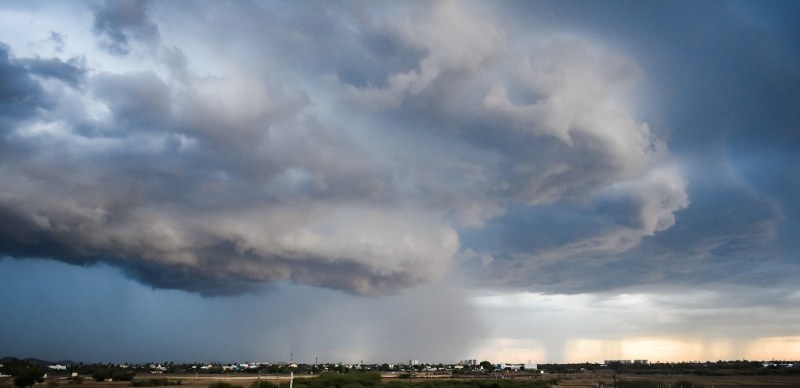 Monsoon
Monsoon IMD maintains 'normal' monsoon prediction amid high probability of El Nino
New Delhi: The weather department on Friday stated that the country will have a ‘normal’ monsoon season, retaining its previous forecast despite a high likelihood of El Nino conditions.
In a press conference on Monsoon 2023, Indian Meteorological Department said, “The southwest monsoon seasonal rainfall over the monsoon core zone consisting of most of the rainfed agriculture areas in the country is most like to be normal, ranging between 96-106% of LPA.”
LPA of rainfall stands for 'long period average' of rainfall. IMD defines it as LPA of rainfall is the rainfall recorded over a particular region for a given interval (like month or season) average over a long period like 30 years, 50 years etc.
Back in April, the meteorological office had forecast that the monsoon rains would be around 96% of the historical average, with a margin of error of plus or minus 5% of the long-term average or LPA.
A ‘normal’ monsoon is of utmost importance, as both the Reserve Bank of India and New Delhi are currently grappling with significant inflationary pressures amidst the looming risks of a global recession.
“Region-wise, the southwest monsoon seasonal rainfall is most likely to be below normal over Northwest India (less than 92% of LPA) and normal over other three broad homogeneous regions; central India (94-106% of LPA), North East India (94-106% of LPA) and South Peninsular India (94-106% of LPA),” IMD said.
Highlights of press conference on Monsoon 2023#monsoon #india #IMD #rainfall #weather@moesgoi @ndmaindia @airnewsalerts @DDNewslive pic.twitter.com/UuUq90KKP0
— India Meteorological Department (@Indiametdept) May 26, 2023
In respect of the spatial distribution of the monsoon seasonal rainfall, normal to above normal rainfall is likely over most areas of south peninsular India, some areas of east central India, and many areas of northeast and extreme north India.
However, normal to below normal rainfall is likely over many areas of northwest India and adjoining west-central India, northern parts of peninsular India, and along the foothills of the Himalayas.
In June, below-normal monthly rainfall is expected over most parts of the country except some areas of south peninsular India, northwest India, extreme north India and some isolated pockets of northeast India, where above-normal rainfall is expected.
However, the weather department warned of above-normal monthly maximum temperatures in June in most parts of the country.
Highlights of press conference on Monsoon 2023#monsoon #india #IMD #rainfall #weather@airnewsalerts @ndmaindia @DDNewslive @moesgoi pic.twitter.com/jy8kXRsf4Y
— India Meteorological Department (@Indiametdept) May 26, 2023
In the extreme north and some parts of southern peninsular India, below-normal and normal temperatures respectively are likely.
IMD said the latest global model forecasts indicate high probabilities for the development of El Nin o conditions over the equatorial Pacific Ocean and positive IOD conditions over the Indian Ocean during the upcoming monsoon season.
“As sea surface temperature (SST) conditions over the Pacific and the Indian Oceans are known to have a strong influence on Indian monsoon, India Meteorological Department (IMD) is carefully monitoring the evolution of sea surface conditions over these Ocean basins,” it stated.
Adequate rainfall during the monsoon season plays a crucial role in shaping the country's inflation trends. It has a direct impact on crop yields, and sufficient rains contribute to increased agricultural output, which in turn helps to stabilize or reduce food prices.
The Southwest monsoon plays a vital role in irrigating over half of India's farmlands, which has a direct impact on the overall well-being of the economy and our daily lives.
India's agriculture sector serves as the primary source of livelihood for approximately 60% of its population and contributes around 18% to the country's economy.
Nearly half of the farmland in India lacks irrigation facilities and relies heavily on the annual rainfall that occurs from June to September to cultivate essential crops like rice, corn, sugarcane, cotton, and soybeans.
Meanwhile, private weather forecaster Skymet has predicted a "below-normal" Southwest monsoon due to the presence of El Nino conditions, which increased the likelihood of drought by 60%.
Skymet predicted that rainfall during the June-September monsoon period would be around 94% of the long-term average (LPA) of 868.6 mm, with a margin of error of 5%.
Support Our Journalism
We cannot do without you.. your contribution supports unbiased journalism
IBNS is not driven by any ism- not wokeism, not racism, not skewed secularism, not hyper right-wing or left liberal ideals, nor by any hardline religious beliefs or hyper nationalism. We want to serve you good old objective news, as they are. We do not judge or preach. We let people decide for themselves. We only try to present factual and well-sourced news.







